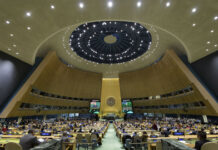Photo credit: DiasporaEngager (www.DiasporaEngager.com).
Spain, Norway, and Ireland officially recognized a Palestinian state on Tuesday, prompting outrage in Israel, whose foreign minister described the move as “incitement to genocide” against the Jewish people.
The coordinated announcement by Madrid, Oslo, and Dublin came on the same day that Denmark’s parliament rejected such a proposal, joining several European countries that have said the conditions have not been met yet to recognize a Palestinian state.
However, officials in Spain, Norway, and Ireland argued such a move would help foster a two-state solution to the Israeli-Palestinian conflict and lead to lasting peace in the region, explaining that the ongoing Israel-Hamas war in Gaza accelerated their plans.
“It’s the only way of advancing toward what everyone recognizes as the only possible solution to achieve a peaceful future, one of a Palestinian state that lives side by side with the Israeli state in peace and security,” Spanish Prime Minister Pedro Sanchez said in a televised address.
Sanchez explained that Spain is recognizing a unified Palestinian state, including the Gaza Strip and the West Bank, under the Palestinian Authority (PA) with East Jerusalem as its capital, based on borders that were in place before the Six-Day War in 1967.
The PA currently exercises limited self-rule in the West Bank, while its rival, the Palestinian terrorist group Hamas, rules Gaza.
Norway described Tuesday’s announcement as a “milestone” in its relationship with the Palestinians.
“For more than 30 years, Norway has been one of the strongest advocates for a Palestinian state,” Norwegian Foreign Minister Espen Barth Eide said in a statement. “Today, when Norway officially recognizes Palestine as a state, is a milestone in the relationship between Norway and Palestine.”
Meanwhile, Dublin said it plans to upgrade its representative office in the West Bank to a full embassy and the Palestinian mission in Ireland will also be offered full embassy status.
“The government recognizes Palestine as a sovereign and independent state and agreed to establish full diplomatic relations between Dublin and Ramallah,” Irish Prime Minister Simon Harris said in a statement on Tuesday. “We had wanted to recognize Palestine at the end of a peace process. However, we have made this move alongside Spain and Norway to keep the miracle of peace alive.”
He added, “This decision of Ireland is about keeping hope alive. It is about believing that a two-state solution is the only way for Israel and Palestine to live side by side in peace and security.”
Harris also called on Israeli Prime Minister Benjamin Netanyahu “to listen to the world and stop the humanitarian catastrophe we are seeing in Gaza.”
Spain and Ireland have been among the most vocal critics of Israel since Oct. 7, when Hamas invaded the Jewish state from neighboring Gaza and launched the current war. The Palestinian terrorists murdered 1,200 people and abducted over 250 others as hostages in their rampage, the deadliest single-day massacre of Jews since the Holocaust. Israel responded with an ongoing military campaign in Gaza aimed at freeing the hostages and destroying Hamas.
It remains unclear how exactly Spain, Norway, and Ireland envision Gaza being incorporated into a Palestinian state if Israel does not pursue its goal of fully removing Hamas from power and eliminating its terrorist infrastructure due to international pressure to halt its campaign.
Recent polling has found that the Palestinian people in both Gaza and the West Bank generally support the Oct. 7 massacre, want Hamas to remain in power in Gaza, and would back Hamas over the PA’s ruling Fatah party in elections.
On Tuesday, Israeli Foreign Minister Israel Katz lashed out at Spain on X/Twitter, saying Sanchez’s government was being “complicit in incitement to genocide against the Jewish people and in war crimes.”
He noted that Spain’s Minister of Labor and Second Vice-President Yolanda Diaz ended a speech last week with the phrase “from the river to the sea Palestine will be free” — a popular slogan among anti-Israel activists that has been widely interpreted as a call for the destruction of the Jewish state, which is located between the Jordan River and the Mediterranean Sea.
Israel had repeatedly warned European countries that unilateral recognition of a Palestinian state in the West Bank and Gaza Strip would effectively amount to a “reward for terrorism” that would hurt the chances of a negotiated resolution to the conflict.
Last week, Israel recalled its ambassadors from Spain, Norway, and Ireland for immediate consultations and reprimanded the three countries’ ambassadors residing in Israel over their governments’ announced plan to recognize a Palestinian state.
The three European envoys were summoned to meet with Israeli Foreign Ministry Director-General Yaakov Blitshtein in Jerusalem. During the meeting, the ambassadors were shown a newly released video of the moments when five female Israeli soldiers were kidnapped by Hamas terrorists in southern Israel on Oct. 7.
In the video, Hamas terrorists force the young women, some of whom are teenagers, against a wall and threaten to kill them.
Of the 27 members of the European Union, Bulgaria, Cyprus, the Czech Republic, Hungary, Poland, Romania, Slovakia, and Sweden have already recognized a Palestinian state. Slovenia is expected to join them on Thursday, and Malta has said it could follow.
Britain and Australia have also said they are considering recognition of a Palestinian state. However, other countries have said the time is not right to do so.
On Tuesday, the Danish parliament rejected a proposal to recognize a Palestinian state, backing the government’s position that the necessary conditions were not in place.
Foreign Minister Lars Lokke Rasmussen had previously said the Danish government could not recognize a Palestinian state because it did not have a single functioning authority or control over its own territory.
“We cannot recognize an independent Palestinian state, for the sole reason that the preconditions are not really there,” he said during a parliamentary debate in April.
Denmark is not alone. Last week, French Foreign Minister Stéphane Séjourné said the conditions to officially recognize a Palestinian state have not yet been met.
“Our position is clear: the recognition of Palestine is not taboo for France,” Séjourné said in a statement.
“This is not just a symbolic issue or a question of political positioning, but a diplomatic tool in the service of the solution of two states living side by side in peace and security,” he continued. “France does not consider that the conditions have yet been met for this decision to have a real impact on this process.”
Germany similarly expressed support for a two-state solution to the Israeli-Palestinian conflict but added that a “process of dialogue” was needed to reach that point.
“An independent Palestinian state remains a firm goal of German foreign policy,” a foreign ministry spokesperson said at a news conference in Berlin. “It’s clear to us that this requires a process of dialogue.”
Some European lawmakers echoed that point. Michael Roth, head of the German parliament’s Foreign Affairs Committee, lambasted the moves to grant recognition.
“I fear this will not bring us any closer to the necessary two-state solution,” Roth told the German RND media outlet last week, adding that it also gives “the false impression that it was only the horrific terror by Hamas on Oct. 7 that led to a new positive dynamic in favor of the Palestinians.”
White House national security adviser Jake Sullivan told reporters on Wednesday that the US supports a two-state solution but believes it should be brought about through direct negotiations between Israel and the Palestinians.
“President Biden … has been equally emphatic on the record that that two-state solution should be brought about through direct negotiations through the parties, not for unilateral recognition,” Sullivan said.
Source of original article: World – Algemeiner.com (www.algemeiner.com).
The content of this article does not necessarily reflect the views or opinion of Global Diaspora News (www.GlobalDiasporaNews.com).
To submit your press release: (https://www.GlobalDiasporaNews.com/pr).
To advertise on Global Diaspora News: (www.GlobalDiasporaNews.com/ads).
Sign up to Global Diaspora News newsletter (https://www.GlobalDiasporaNews.com/newsletter/) to start receiving updates and opportunities directly in your email inbox for free.





























